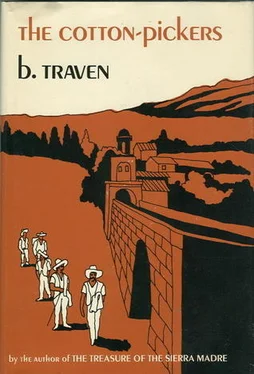B. Traven - The Cotton-Pickers
Здесь есть возможность читать онлайн «B. Traven - The Cotton-Pickers» весь текст электронной книги совершенно бесплатно (целиком полную версию без сокращений). В некоторых случаях можно слушать аудио, скачать через торрент в формате fb2 и присутствует краткое содержание. Год выпуска: 1969, Издательство: Hill and Wang, Жанр: Проза, на английском языке. Описание произведения, (предисловие) а так же отзывы посетителей доступны на портале библиотеки ЛибКат.
- Название:The Cotton-Pickers
- Автор:
- Издательство:Hill and Wang
- Жанр:
- Год:1969
- ISBN:нет данных
- Рейтинг книги:3 / 5. Голосов: 1
-
Избранное:Добавить в избранное
- Отзывы:
-
Ваша оценка:
- 60
- 1
- 2
- 3
- 4
- 5
The Cotton-Pickers: краткое содержание, описание и аннотация
Предлагаем к чтению аннотацию, описание, краткое содержание или предисловие (зависит от того, что написал сам автор книги «The Cotton-Pickers»). Если вы не нашли необходимую информацию о книге — напишите в комментариях, мы постараемся отыскать её.
—Book World
The Cotton-Pickers — читать онлайн бесплатно полную книгу (весь текст) целиком
Ниже представлен текст книги, разбитый по страницам. Система сохранения места последней прочитанной страницы, позволяет с удобством читать онлайн бесплатно книгу «The Cotton-Pickers», без необходимости каждый раз заново искать на чём Вы остановились. Поставьте закладку, и сможете в любой момент перейти на страницу, на которой закончили чтение.
Интервал:
Закладка:
“This is a fine business,” I said, “making a fellow spend railway fare when he’s practically broke to start with. I’ll tell you something, Mr. Mason, there’s something wrong here. Someone has done me out of my time and money.”
“Well, you can start picking here if you like,” Mr. Mason relented now, “but it won’t be worth your effort. I’ve got only natives picking, and they do it cheap, very, very cheap. And there’s no place for you to live around here.”
“I don’t need a blueprint to see how things are,” I said. “Have you ever worked as a carpenter?”
“I’m an experienced joiner.”
If you don’t want to starve in that part of the world you have to be able to do anything. I hadn’t the faintest idea of carpentry, but I thought that once I was confronted with the job and had a tool in my hand, the rest would follow automatically.
“If you’re a carpenter, I can get work for you,” said Mr. Mason. “There’s a farmer who’s building himself a new house, and he can’t get on with it because he doesn’t know anything about joinery. I’ll give you a note to him. He’s only an hour’s hike from the station.”
I wasn’t born yesterday. I knew perfectly well that no farmer wanted a carpenter and that Mr. Mason was only planning to get rid of me before I insisted that he pay my fare. No doubt he’d instructed Mr. Wood to send pickers to him, and meanwhile he’d hired Indian pickers for less money. That’s the kind of tricks they pull on the unemployed; they recruited men all over the area, not being sure how many would turn up. Wherever the farmers had friends or acquaintances they’d send word for pickers, and there were always those dupes and down-and-outers who’d risk their last peso on the train fare. Then the farmer would choose the cheapest workers and, what’s more, he’d beat down the pickers’ wages; for the migrant worker wouldn’t have the money to get away again and would be forced to pick for as little as three centavos the kilo.
There was no point in my arguing with Mason, for the only way to settle accounts with him would have been to push his face in; but he had a gun in his back pocket, and no matter how well I aimed my fists they were no match for nickel-plated bullets.
So I had to go back to the station, and while there I thought I might as well call on the farmer. It was just as I’d thought; he didn’t want a carpenter, for he was carpenter enough himself to have built a good solid house with the help of three natives. However, my asking for a job got me a good meal. And the farmer confirmed that Mason was the meanest kind of welcher and pulled the same dirty trick every year, so that an influx of whites looking for work enabled him to cut the natives’ wages to rock bottom. For these poor fellows, who had hardly any other income during the whole year, resigned themselves to the constant lowering of their wages when they saw that even white men were begging for the job of picking cotton.
19
When I got back to town I had just two pesos left — after all those months in the bakehouse.
I went to the boardinghouse, where I hoped to find Antonio, but he wasn’t there. He never went to bed before twelve, for life was at its best in the cool evening when pretty girls promenaded in the plaza while the band played. So I went in search of him.
Unable to find him in any of the plazas, I thought that he might be at the gambling joint. It was on the upper floor of a certain large house which had a bar on the ground floor. No drinks were sold in the gambling salons, but ice water could be had, gratis. I went in just as I was, without vest or jacket, for the owners and managers weren’t concerned with what customers had on their backs, but with what they had in their pockets. A man in a work shirt might have two or three months’ oil driller’s wages in his work pants. The more grease-stained and muddied his trousers, his shirt and hat and boots, the more likely it was that he had two or three thousand pesos on him and had come to the joint to try to double the amount.
On the landing two men sat at a small table and watched everyone who went upstairs. They knew every customer who had been there before and had a good memory for the faces of those who weren’t allowed to enter because of past misbehavior. If a customer claimed that a croupier had defrauded him, the croupier would pay out the ten or twenty pesos in question without a word of argument, despite the fact that the bank was in the right; but the gambler would never be allowed in the place again.
Cards and dice were promptly changed if a player showed the slightest suspicion that he was losing by some sort of manipulation; but, in fact, the bank never cheated. If anyone cheated, it was the guests. The bank knew that it was good business to play absolutely straight.
The gambling hall was jammed, and if it hadn’t been for the many fans and ventilators, the heat would have made any long stay impossible. There were roulette tables, poker tables, baccarat, and even “seventeen and four” games. One bank was kept by a Chinese who was a member of the board. This place was called the Jockey Club, and it was open to members only; handily enough, you became a member when you entered. Though the law required that every player hold a membership card, no one was ever asked to show his card, certainly never a white man.
I had guessed right. Antonio was there. He was standing at a dice table, where a “steerer,” paid to stimulate interest at empty tables, was playing. The steerer was raising his stake at every throw, until at last he was staking twenty-five pesos at a time, and this attracted the attention of the guests who were at other tables. People were intrigued by the high stake; they pressed nearer; they crowded around to watch the reckless player. Naturally the steerer had ordinary gambler’s luck, but it wasn’t his own money at stake; it was the bank’s. The less-experienced guests, of course, didn’t know that the fellow was a steerer. So, within a few minutes, the table was besieged by a dozen excited men watching the fall of the dice and mentally calculating combinations and intervals at which the numbers were recurring. As soon as they felt that they had figured out the combinations they started playing; so the dice table, which had been empty ten minutes earlier, with only the croupier standing by it, was now the center of attention. Every square was taken, three or four times over.
This drained the baccarat table of players and gave its croupier a chance to make up his accounts, exchange chips, chips, and stack up a new pack of cards. When he was all set again, and the croupier at the dice table was beginning to sweat, two steerers came and started to play at the baccarat table. Gradually the dice game slowed down, while the crowd at the baccarat table increased.
In one corner a bank was being auctioned; the bidding started at five pesos, the next bid was ten, and it finally went for sixty pesos. I looked over at the man who had bought it.
“Damn it all, Leary, old boy, what are you doing here?” I called, for I’d worked with Leary at the oil camp. “I’ll cross my fingers for you, Leary, up to three hundred. Agreed?” I shouted.
“Agreed, Gales,” he called back.
The people who had heard us laughed and cane over to the table where Leary sat down to take over his bank. The play started. Leary had to bleed — a hundred, two hundred, three hundred. He shelled out the money in stacks and pushed it to the winners. He had run out of chips.
“Damn it, Gales, what’s up?”
’Don’t worry, Leary, throw in all you’ve got!”
“All right, I’ll do it,” Leary called over, “but I’ll be after your blood if I’m left in the lurch.”
Читать дальшеИнтервал:
Закладка:
Похожие книги на «The Cotton-Pickers»
Представляем Вашему вниманию похожие книги на «The Cotton-Pickers» списком для выбора. Мы отобрали схожую по названию и смыслу литературу в надежде предоставить читателям больше вариантов отыскать новые, интересные, ещё непрочитанные произведения.
Обсуждение, отзывы о книге «The Cotton-Pickers» и просто собственные мнения читателей. Оставьте ваши комментарии, напишите, что Вы думаете о произведении, его смысле или главных героях. Укажите что конкретно понравилось, а что нет, и почему Вы так считаете.











